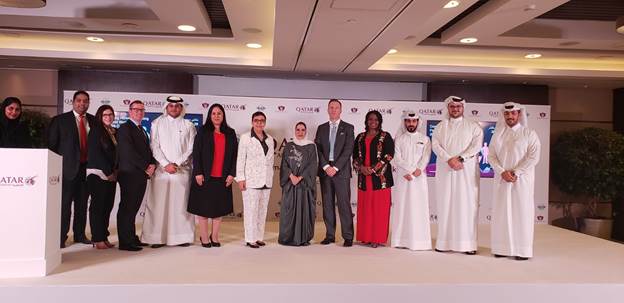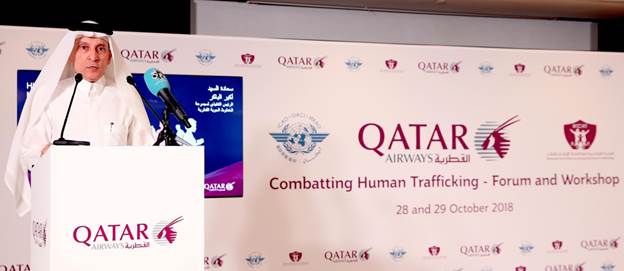Globally, nearly 25 million people are trafficked annually. While the causes and mechanisms of this phenomenon are many and varied, the aviation community must take note of the following: the extensive reach of the global air transport network, which carried over 4 billion passengers last year alone, means that flight is one of the primary modes of transportation utilized by traffickers.
This means that flight crew members’ role as a first point of reporting of suspected cases of trafficking to law enforcement is crucially important. Due to the large numbers of victims being transported by air, the International Civil Aviation Organization (ICAO) has cooperated with the Office of the United Nations High Commissioner for Human Rights (OHCHR) to launch an initiative which included guidelines that, as ICAO’s Secretary General Dr. Fang Liu explained, “provide cabin crew with the reporting and response procedures should they find themselves confronting a potential trafficking situation.”
These guidelines – the ICAO-OHCHR Guidelines for Training Cabin Crew on Identifying and Responding to Trafficking in Persons – are timely and essential given that the International Labour Organization (ILO) estimates that 1-in-200 people worldwide are currently being forced into working and living conditions akin to modern slavery as a result of trafficking.

A variety of key stakeholders recently met at the “Combating Human Trafficking Forum” in Doha, where various anti-trafficking initiatives were presented. The event, hosted by Qatar Airways, was attended by representatives from the ICAO, IATA, the Airline Ambassadors International (AAI), OHCHR and several decision makers from the different airports and airlines. A number of initiatives aimed at fighting human trafficking were considered by participants at the Forum.
Delivering remarks at the event, a board member of AAI and survivor of human trafficking, Pastor Donna Hubbard underscored the urgent need for stakeholders in the global air transport sector to combat human trafficking, which is estimated to enslave 40 million persons worldwide.

Pastor Hubbard remarks were re-emphasized by Group CEO of Qatar Airways and Chairman of the IATA Board, Mr. Akbar Al-Baker, who stressed the need to “raise awareness on human trafficking across our country and the world, and to train our staff on every aircraft and in every office around the globe. We are in the business of freedom, and we will not allow this crime to fly under the radar.”
 Al-Baker highlighted the crucial importance of advocacy and commitment to end human trafficking in his address at the event.
Al-Baker highlighted the crucial importance of advocacy and commitment to end human trafficking in his address at the event.
At the Forum, ICAO delivered a comprehensive workshop on implementation guidelines which shall stand as reference to the aviation world. This comes as part of the UN specialized agency’s commitment to achieving the United Nations Sustainable Development Goals for 2030.
It is worth mentioning that coordinated efforts have been exterted by IATA and Airports Council International (ACI) through a campaign urging not only airline staff but also the travelling public to keep their #eyesopen to human trafficking. This follows a series of attempts to raising global awareness including the 2009 global campaign “Blue Heart” launched by the United Nations office on Drug and Crime (UNODC).
Highlighting the aviation network’s commitment; the forum builds on the momentum of the 74th IATA Annual General Meeting, held earlier this year which approved the resolution denouncing human trafficking and gained wide-commitment by airlines to implement several key anti-trafficking initiatives globally.
And while the race to #EndHumanTrafficking continues, the public has an important role to play: help us raise awareness by sharing this article with your community.
